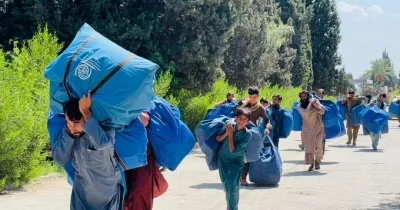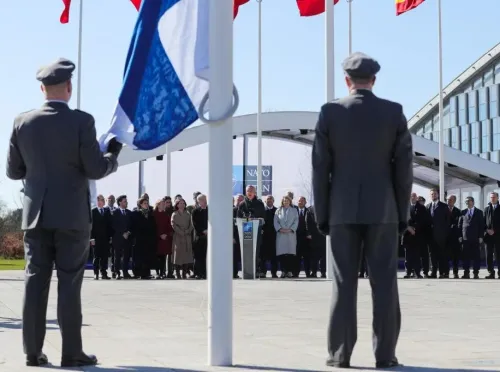Why Are Afghan Migrants Facing Humiliation During Forced Deportations?

Synopsis
Key Takeaways
- Afghan migrants face increasing deportations from Pakistan.
- Reports of humiliation and mistreatment are widespread.
- Over 1.2 million Afghans have returned to Afghanistan recently.
- Support systems are in place but inadequate.
- Urgent international aid is needed to avert a humanitarian crisis.
Kabul, Aug 3 (NationPress) Afghan migrants have recounted their distress following their forced removal from Pakistan, as Islamabad has ramped up the third phase of deportations. They expressed feelings of humiliation and reported that Pakistani officials demanded money for their documentation.
The deportation efforts have intensified in Khyber Pakhtunkhwa after earlier phases in Sindh and Punjab.
As quoted by Afghanistan-based Tolo News, Pakistan's Ministry of Interior has instructed all provincial governments that the presence of Afghan nationals without valid visas and passports is now illegal, and they must be arrested and deported.
At the temporary Omari camp in Torkham township, Mohammad Hashim Maiwandwal stated that measures have been implemented for the returnees, with all committees effectively providing necessary services.
He added, “Organized arrangements have been established for the returnees. The transport committee covers travel costs, ensuring they arrive safely in their respective provinces.”
According to Hashim Maiwandwal, the health committee has established clinics for medical treatment, and the temporary housing committee has set up tents for shelter.
He continued, “The finance committee provides them with between 8,000 and 10,000 Afghanis. The health committee has set up clinics for treatment, and the temporary housing committee has installed tents for their accommodation.”
Meanwhile, several Afghan families possessing valid Proof of Registration (PoR) cards have disclosed troubling experiences with local media regarding mistreatment by Pakistani officials at the Torkham migrant camp.
Ziaul Haq, a deportee, expressed joy at returning to Afghanistan, saying, “We were very happy to return to our homeland. This is our own land. In Pakistan, Afghan refugees are treated with no dignity and are humiliated.”
Another deportee, Hedayatullah, recounted his mistreatment in Pakistan, stating, “I got a call from home saying to come quickly because our belongings had been packed. We were treated very badly there, despite having PoR cards and legal documents.”
Inzamamul Haq, a 28-year-old from Kunar province, who was recently deported with his family after residing in Pakistan for 40 years, reported, “When we reached the checkpoint, they demanded 200,000 Pakistani rupees. They gave us two days, took our documents, and when our vehicle arrived, they took the money, returned our documents, and deported us.”
A recent report by the United Nations High Commissioner for Refugees (UNHCR) disclosed that nearly 1.2 million Afghans have returned from Pakistan since September 2023.
The UNHCR report indicated that many returning Afghans face dire circumstances and called for immediate assistance to avert a worsening humanitarian crisis.
Women and girls comprise roughly half of those receiving aid, while about 2.2 percent of all returnees are individuals with disabilities, according to Afghanistan-based Khaama Press, which cited the UNHCR report released on Thursday.
The agency further stated that over 315,000 Afghans returned to Afghanistan in 2025 alone, with 51,000 forcibly deported by Pakistani authorities.
Political and security pressures in Pakistan are increasingly threatening the status of over two million Afghan refugees who have lived in the country for decades.
--INS
int/akl/sd










